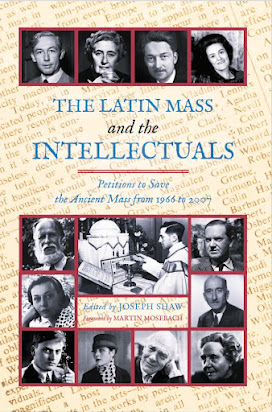(Reposted) I delighted to announce the launch of
The Latin Mass and the Intellectuals:
Petitions to Save the ancient Mass from 1966 to 2007
Preface
by Martin Mosebach
With contributions from Leo Darroch, Fr Gabriel Díaz-Patri, Philip Maxence, Sebastian Morello, Matthew Schellhorn, and Erik Tonning
In due course it will be available from Arouca Press (in the USA) and the Latin Mass Society shop (in the UK), and Amazon: see my author page.
I introduced it in Rome, at the Pax Liturgia Conference, Friday 27th October.
The London launch will take place at the St Wilfrid Hall, London Oratory SW7 2RP
6:30 for 7pm; refreshments
All welcome. Please RSVP through Eventbrite
More about the book can be found here.
When the Church's ancient Mass was in peril, in 1966, 1971, and in later years, a huge outpouring of support for it came from artists and intellectuals, many Catholic, many not, including Anglicans, Jews, non-believers, and even Communist sympathisers. What they recognised is that this Mass is part of the cultural and spiritual patrimony of the whole world, and that it would be a tragedy if it were to cease to be celebrated.
This book looks at the petitions, the petitioners, their historical context, the arguments they used, and the intellectual and artistic movements of which they were part. It includes long-forgotten documents, new archival research, and discussions of key ideas. Why did the pacifists like Lanzo Del Vasto and E.I Watkin sign? What was the appeal of the Mass to artistic modernists like David Jones, Benjamin Britten, Robert Lowell, and Sir James MacMillan? How is this connected with the movement promoting the Middle Ages? Why did so many converts sign, like Evelyn Waugh, Malcomn Muggeridge, and Compton MacKenzie? Why are there so many Argentinians among the signatories, so many members of the Académie française, so many Nobel laureates and nominees, and so many people who had distinguished themselves in the fight against Fascism?
Furthermore, this book draws out from the shadows the outstanding contribution to the organisation of the early petitions by otherwise obscure figures: the Italian Cristina Campo, and the Englishman Bernard Wall, their circles and their concerns.
As the Trappist, and theological liberal, Thomas Merton wrote in 1964:
As you know, I have many friends in the world who are artists, poets, authors, editors, etc. Now they are well able to appreciate our chant and even our Latin. But they are all, without exception, scandalized and grieved when I tell them that probably this Office, this Mass will no longer be here in ten years. And that is the worst. The monks cannot understand this treasure they possess, and they throw it out to look for something else, when seculars, who for the most part are not even Christians, are able to love this incomparable art.
Support the Latin Mass Society

No comments:
Post a Comment